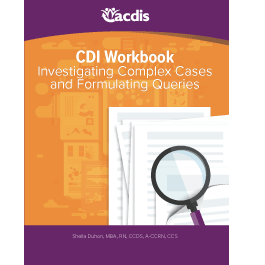Book excerpt: The dos and don’ts for effective queries

Cases and Formulating Queries
By Sheila Duhon, MBA, RN, CCDS, A-CCRN, CCS
If you incorporate the practices and tenets below into your query development, you will find your queries are clearer, more direct in intent (but not directing in terms of response desired from the provider), and to the point, with results more aligned with the CDI process.
All queries should include a bulleted or numbered list of clinical indicators (long paragraphs and sentences are generally not concise and precise and therefore should be avoided whenever possible) and ensure that the query includes:
- Patient-specific clinical indicators relevant to the question being asked
- Location of the clinical indicators’ origin within the medical record
- Name and position of the individual who documented the clinical indicators identified
- Timing of the clinical indicator noted
Queries are submitted to highly educated professionals who are typically short on time. Therefore, do your best to eliminate time-wasting components of a query that are not relevant to the intent of the query. Avoid losing credibility with the physician by presenting queries that are easy to decipher, are well written and without grammatical, spelling, or formatting errors, and are direct and to the point. Such efforts on the part of the CDI professional are generally better received and therefore stand a better chance of engagement and response from the provider. In short, if you are going to take the time and effort to submit a query, do it right—each and every time.
The don’ts
If you avoid the following pitfalls, your query results will be more meaningful for data collection and ensure the record accurately reflects the patient’s true medical conditions.
Compliant queries should never indicate the impact on:
- Reimbursement, DRG, length of stay, or relative weight
- Physician or organization quality scoring or profiling
- Addition of a CC or MCC
The query should also never paraphrase or summarize findings in your own words as this could be considered leading.
Developing an effective and compliant query process takes time, education, and practice. A new CDI specialist will likely work closely with an experienced CDI specialist or coding professional to learn and hone the skills necessary to develop “submission-worthy” queries. Adding this skill to your repertoire includes a learning curve—sometimes a steep one. Developing clinically sound, coding-compliant query skills, however, is immeasurable in terms of effect and value added to the organization’s CDI mission.
Editor’s note: This article is an excerpt from CDI Workbook: Investigating Complex Cases and Formulating Queries.
